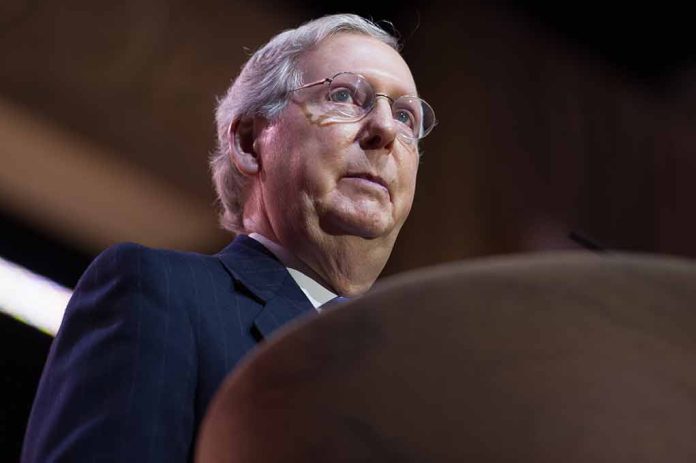
Senate confirms Robert F. Kennedy Jr. as Health Secretary despite Mitch McConnell’s opposition, sparking controversy and revealing GOP divisions.
Key Takeaways
- Robert F. Kennedy Jr. narrowly confirmed as HHS Secretary in 52-48 Senate vote
- Mitch McConnell, lone Republican opposing, cites Kennedy’s vaccine skepticism
- Trump criticizes McConnell’s vote, highlighting internal GOP tensions
- Kennedy’s appointment raises concerns about public health policy direction
- Confirmation underscores Trump’s continued influence in Republican politics
Senate Confirmation and McConnell’s Opposition
In a narrow 52-48 vote, the Senate confirmed Robert F. Kennedy Jr. as the new Secretary of Health and Human Services. The confirmation came despite strong opposition from Senate Minority Leader Mitch McConnell, who stood as the lone Republican voice against Kennedy’s appointment. McConnell’s dissent stemmed from Kennedy’s history of promoting conspiracy theories and undermining public trust in vaccines.
McConnell, a polio survivor himself, emphasized the critical role of vaccines in public health. He stated, “I’m a survivor of childhood polio. In my lifetime, I’ve watched vaccines save millions of lives from devastating diseases across America and around the world. I will not condone the re-litigation of proven cures, and neither will millions of Americans who credit their survival and quality of life to scientific miracles.”
The long-time senator said Thursday that RFK Jr. had a "record of trafficking in dangerous conspiracy theories." https://t.co/bbtKAe3b1J
— Newsweek (@Newsweek) February 13, 2025
Trump’s Reaction and GOP Division
President Donald Trump, who nominated Kennedy for the position, publicly criticized McConnell’s vote. Trump’s support for Kennedy, who had previously endorsed Trump after dropping his own presidential bid, highlights the ongoing struggle for dominance within the Republican Party. This incident underscores the clash between Trump’s emerging faction and the more conventional party approach represented by established figures like McConnell.
“Individuals, parents, and families have a right to push for a healthier nation and demand the best possible scientific guidance on preventing and treating illness. But a record of trafficking in dangerous conspiracy theories and eroding trust in public health institutions does not entitle Mr. Kennedy to lead these important efforts.” – Mitch McConnell
Concerns and Expectations for Kennedy’s Leadership
Kennedy’s confirmation has raised concerns among health experts and some lawmakers about the future direction of public health policy. During his confirmation hearings, Kennedy attempted to moderate his stance, expressing support for polio and measles vaccines. However, he maintained some controversial views on vaccines and autism, which continue to worry public health advocates.
Senate Minority Leader Chuck Schumer voiced strong opposition to Kennedy’s appointment, stating, “Robert F. Kennedy Jr. is not remotely qualified to become the next Secretary of Health and Human Services. In fact, I might go further. Robert F. Kennedy Jr. might be one of the least qualified people the president could have chosen for the job. It’s almost as if Mr. Kennedy’s beliefs, history, and background were tailor-made to be the exact opposite of what the job demands.”
Despite these concerns, some Republican senators, including Bill Cassidy and Susan Collins, supported Kennedy after receiving commitments and assurances from him. White House Press Secretary Karoline Leavitt expressed optimism about improving public health under Kennedy’s leadership.
US Senate confirms President Donald Trump’s Nominee for Health & Human Services Secretary, Robert F. Kennedy, Jr. in a 52-48 vote. Every Democrat & Republican Senator Mitch McConnell opposed the nomination. https://t.co/hPqtrydxkf
— Marie Coronel (@MarieCoronelSD) February 13, 2025
Implications for Public Health Policy
As Kennedy takes office, he will oversee a large network of health-related agencies. His promises to focus on healthy foods, scrutinize chemical additives, and remove financial conflicts of interest will be closely watched. Additionally, Kennedy will face the challenge of addressing drug pricing and maintaining the 2022 prescription drug law, as highlighted by Merith Basey from Patients for Affordable Drugs.
McConnell, while opposing Kennedy’s confirmation, expressed hope that the new HHS Secretary would work to restore trust in public health institutions. The senator emphasized, “This Administration – led by the same President who delivered a medical miracle with Project Warp Speed – deserves a leader who is willing to acknowledge without qualification the efficacy of life-saving vaccines and who can demonstrate an understanding of basic elements of the U.S. healthcare system.”
As Kennedy begins his tenure as Health Secretary, the nation watches closely to see how he will navigate the complex landscape of public health policy and whether he can bridge the divide between his controversial past statements and the critical responsibilities of his new role.
Sources:
- Mitch McConnell’s Full Statement on Vote Against Trump Nominee RFK Jr. – Newsweek
- Robert F. Kennedy Jr. narrowly confirmed by Senate as Trump’s health secretary – ABC News
- Why Mitch McConnell voted against RFK Jr. for health secretary
- Trump Slams Sen. McConnell for Voting Against RFK Jr. | Newsmax.com



